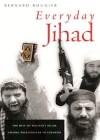Book Review - Everyday Jihad: The Rise of Militant Islam Among Palestinians in Lebanon
Everyday Jihad: The Rise of Militant Islam Among Palestinians in Lebanon
Written by: Bernard Rougier,
Harvard University Press, Cambridge: Massachusetts, 2007,
ISBN: 9780674025295, 298 pp.
Reviewed by: Lieutenant Colonel Jason Thomas
This is not a text that will find its way onto the shelves of your local bookshop, though the reason is not because it has a title that raised a few eyebrows when I carried it onto some domestic airline flights. Bernard Rougier is a French academic who appears to have spent a considerable amount of time in and around the Palestinian refugee camps of Lebanon. This book is a translation of Rougier’s work and has only recently been published by the Harvard University Press. It is current and topical.
Rougier describes in a detailed, balanced and non-judgmental fashion the rise of Salafist militancy in the Palestinian refugee camps of Lebanon. A key strength of his narrative is the analysis of direct sources, either interviews, research of sermons or Sunni militant websites and newspapers. Rougier is not a supporter of any faction or cause; indeed, he is equally damning of the damage the short-term political games of the states engaged in Lebanon (Syria, Saudi Arabia, Iran, Israel et al) as he is of the nature of Sunni fundamentalist rhetoric.
This is not a book for those wish to begin reading in to the complex, tragic and still delicately balanced situation that is the Palestinian/Israel/Lebanon entanglement. With an unsteady Israeli peace with Egypt, Jordan and even Syria, Rougier describes a potentially disturbing change in the Lebanon balance. For decades the treatment of Palestinian refugees in Lebanon has, even by standards of the region, been ‘oppressive’, with no or limited opportunity for work, education or the right to vote. There are reasons for this containment of the refugees, but it has provided fertile ground for the rise of an extreme form of Sunni fundamentalism with a doctrine of global jihad. This dogma reaches beyond the confines of Lebanon, in terms of both who it is attracting and what it wishes to change. The means do not match the rhetoric, but nor are they withering on the vine. At the very least the potential for regional instability is growing and it is a form of militancy that sees only black and white—even Hezbollah and the United Nations are seen in a dark shade. Perhaps my only criticism of this text, aside from a relatively dry translation (or maybe Rougier writes this way), is that he provides no indication of future capability or intent emerging from within Lebanon. For a man who has probably shown considerable bravery in going into the camps, this is disappointing.
Everyday Jihad is not recommended for someone wishing to start understanding (or at least trying to understand) this tortured and pivotal part of the world. The Iron Wall by Avi Shlaim and War without End by Anton La Guardia are, for example, better starting points. Rougier’s text is academic in tone, leaving the reader to deduce what lessons need to be learnt. It does, however, provide salient warning to those (particularly in the United States) who believe that military power alone will win the war on terror. It is also fertile ground for background analysis, in particular for those that will deploy to UNTSO or may wish to rigorously debate the blithely accepted Adaptive Campaigning. There are deep-seated issues folded into the description of the Palestinian microcosm presented by Rougier. They are worthy of great reflection for military and civilian strategic planners alike, in particular the fundamental importance of never disenfranchising any ethnic group in a nation or community, be they there by choice or otherwise.



